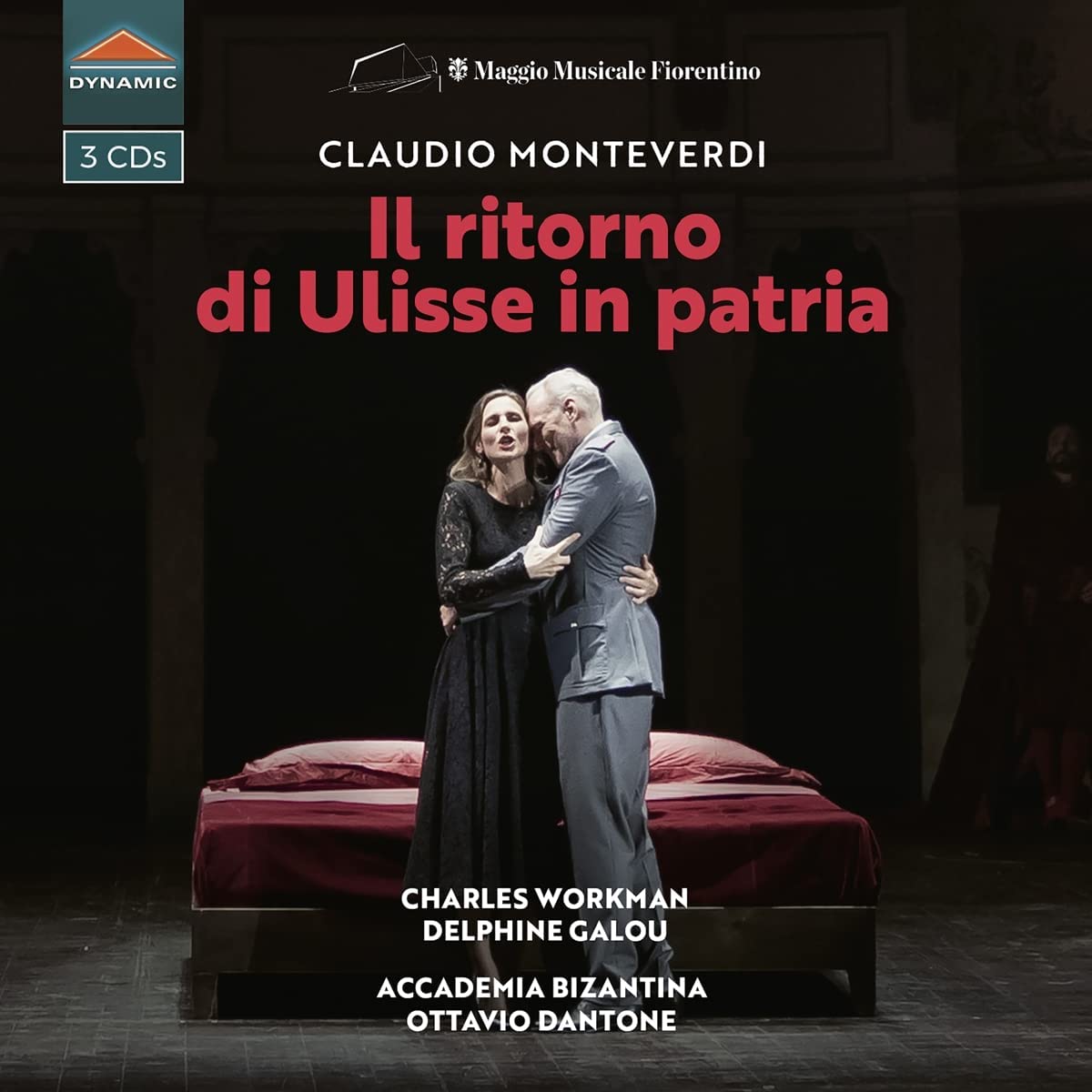Charles Workman Ulisse, Delphine Galou Penelope Accademia Bizantina, Ottavio Dantone (cond)
158:46 (3 CDs)
Dynamic 7927.03
Click HERE to buy this on amazon.co.uk
[This is a sponsored link: clicking it also keeps this site FREE to access]
The opening of the notes provided with this set read, ‘The first opera composed by Monteverdi for a Venetian theatre [SS Giovanni e Paolo, 1640], at the time when in Venice the system of paying public theatres was being consolidated, is miles away from Orfeo.’ Indeed it is. In every sense. So one wonders why Ottavio Dantone decided to drag Il ritorno di Ulisse in patria back fifty years into the sound world of Orfeo rather than recreate one appropriate to mid-17th century Venetian theatres? Recorders pipe, cornetti add their agile roulades and a rich continuo section includes a plonking harp. All that is lacking is sackbuts and half a dozen chamber organs of differing kinds.
Dantone’s recording stems from a production by Robert Carson given at Florence’s Teatro della Pergola as part of the Maggio Musicale Fiorentino season in June 2021. For those interested, a DVD has been simultaneously released. Illustrations in the booklet suggest a drab-looking modern production with the occasional nod in the direction of period style. As is well known, the score as it has come down to us is incomplete, most notably in the absence of musical settings for several scenes. The edition prepared by Dantone is what would be considered ‘complete’, although some of his musical decisions, such as his treatment of the strange chordal introduction to Penelope’s opening lament, might be thought odd.
My admiration for Dantone’s work in later Baroque music and opera is near boundless, in particular his recognition, rare among conductors, of the dramatic importance of recitative. Here, where we are still very much in the province of prima le parole, poi la musica, that takes on still greater importance. It is one of the great strengths of the performance that it is obvious that much work in this respect has been done by Dantone and his music staff on the 21(!) named soloists, whose diction is largely exemplary. Paradoxically this laudable emphasis on the rhetorical rather than the lyrical also has a downside. From the outset, Dantone’s handling of the continuo group is exceptionally vigorous, excitable, even in places trenchant. At points such as the slaughter of the suitors that pays dividends, but it also encourages singing that is too forced, that at its most extreme encourages the shouting in which some of the cast at times indulge. Leaving aside the two principals, to whom I’ll turn shortly, the cast is in general disappointingly ordinary. The majority are seemingly unfamiliar with the demands of mid-17th century opera – stylish ornamentation is at an absolute premium – and are pushed by Dantone’s approach to sing with too much force and vibrato. I’ll excuse from the general criticism the Minerva of the excellent Arianna Vendittelli, one of the few soloists with a recognisable name, and to a marginally lesser degree Miriam Albano, whose Melanto conveys a certain lively charm.
That brings us to the protagonists. Penelope is one of the great creations of not just early opera but opera of any period, the benchmark immediately laid out in the extended and magnificent opening lament for her long-absent husband. My high hopes of Delphine Galou – for whose work my admiration runs as strongly as it does for her husband (she is Signora Dantone) – were sadly not realised. Although Galou sings with the commitment and conviction she brings to all she does, she somehow does not sound fully at ease with a style that is not her familiar territory, neither does the part seem to lie well for her. Certainly when one thinks back to some of the great Penelopes, Janet Baker and Sara Mingardo, for instance, this cannot be accounted one of Galou’s most successful roles. To check my memories, I went back to Mingardo’s singing of ‘Di misera regina’ (the lament). Mingardo sounds like a singer that has lived with the role, Galou doesn’t. The versatile tenor Charles Workman is to an even greater extent than Galou a stranger to this repertoire. While again his commitment is not in doubt and he is certainly a strong and forceful Ulisse, his at times overwrought singing is not especially appealing and he somehow fails to move the listener even in the tender final pages of the opera. His performance of the Ulisse’s opening scene, his drowsy awakening and subsequent bleak mood (act 1, sc 7) lacks the quality of that of Anizio Zorzi Giustiniani for example in Claudio Cavina’s Glossa set, currently my first choice for a commercial recording. Finest of all but sadly not available commercially is the Rinaldo Alessandrini performance from the 2010 Beaune Festival, which not only incorporates Mingardo’s wonderful Penelope but also conclusively proves that the modest forces intended in Venetian operas of the period work supremely well.
A final thought on that topic. Dantone’s Florence performances were lavishly praised by the critics, not one of whom – to the best of my knowledge – even mentioned the anachronistic instrumental forces employed. That (and much else) is a sad reflection of the invariable ineptitude of most current early opera criticism.
Brian Robins
